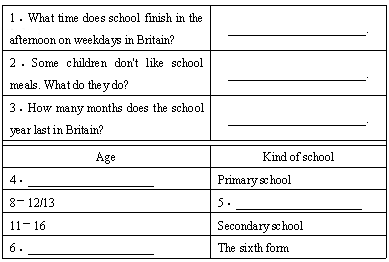
题目列表(包括答案和解析)
| |||||||||||||||||||||||||||||||||||||||||||||||||||||||||||||||||||||||||||||||||||||||||||||||||||||||||||||||||||||||||||
| |||||||||||||||||||||||||||||||||||||||||||||||||||||||||||||||||||||||||
I am a middle-school student. Now let ___1___ tell you something ___2___ our classroom.
It's very ___3___. There are two maps ___4___ the back wall. ___5___ is a map of China.
___6___ is a map of the world (世界).
There are ___7___ desks and chairs in our classroom. There is a big desk ___8___ the
teacher in the front of it. We ___9___ four classes in the ___10___ and two in the afternoon
1. a. I b. my c. me d. we
2. a. about b. in c. on d. at
3. a. small b. big c. bigger d. biggest
4. a. in b. on c. under d. over
5. a. It b. It's c. One d. one
6. a. Other b. Others c. Another d. The other
7. a. fourty b. forty c. forteen d. fourteenth
8. a. for b. of c. to d. about
9. a. there is b. there are c. has d. have
10. a. moning b. mourning c. morning d. moring
阅读理解
Maybe there are many differences between going to school in Britain and going to school in your country. In Britain school starts between 8:30 and 9:00 and finishes at about 4 o'clock in the afternoon. It is a long day but there are no lessons on Saturdays. Children usually have lunch at school. School meals are not very expensive and are quite good. But some children don't like them and bring sandwiches or go home.
In Britain school holidays are different from those in other countries. They are shorter at Christmas and Easter but much longer in the summer. The school year starts in the first week in September and ends in the third or fourth week of July.
Children start primary school when they are five years old; they stay there until they are eleven. Then they usually go to a secondary school. Children cannot leave. school before they are sixteen. At this age most students take public exams. Students who continue their studies go into the sixth form. If their school doesn't have a sixth form, they change schools or go to a college. Students need two years in the sixth form, and they take more public exams. In some parts of Britain, students go to middle school at the age of eight and then go to secondary schools when they are twelve or thirteen.

| |||||||||||||||||||||||||||||||||||||||||||||||||||||||||||||||||||||||||||||||||||||||||||||||||||||||||||||||||||||||||||||||||||||||||||||||
湖北省互联网违法和不良信息举报平台 | 网上有害信息举报专区 | 电信诈骗举报专区 | 涉历史虚无主义有害信息举报专区 | 涉企侵权举报专区
违法和不良信息举报电话:027-86699610 举报邮箱:58377363@163.com